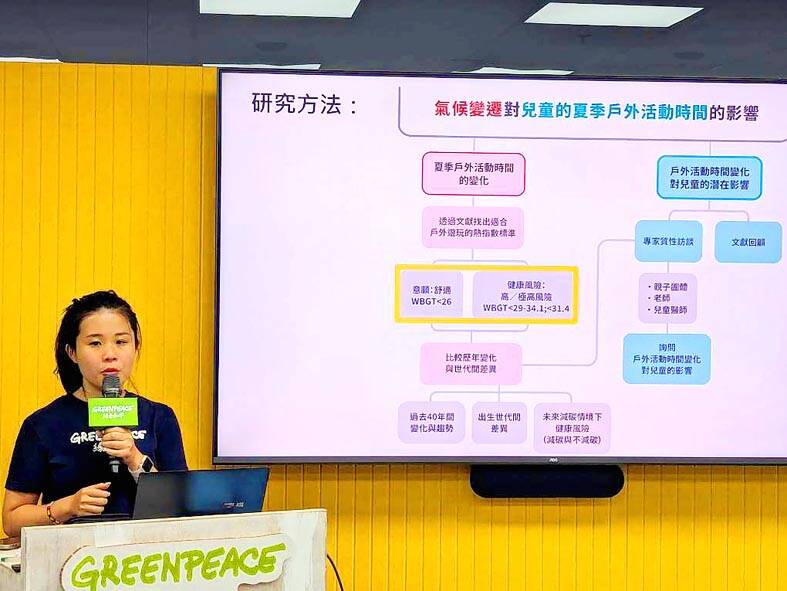The government should improve children’s outdoor spaces and accelerate carbon reduction programs, as the risk of heat-related injury due to high summer temperatures rises each year, Greenpeace told a news conference yesterday.
Greenpeace examined summer temperatures in Taipei, New Taipei City, Taoyuan, Hsinchu City, Taichung, Tainan and Kaohsiung to determine the effects of high temperatures and climate change on children’s outdoor activities, citing data garnered by China Medical University, which defines a wet-bulb globe temperature (WBGT) of 29°C or higher as posing the risk of heat-related injury.
According to the Central Weather Administration, WBGT, commonly referred to as the heat index, estimates the effect of heat stress on humans by combining temperature, humidity, wind speed, sun angle and cloud cover.

Photo: CNA
Greenpeace said that in the summer of 2023, there were 780 hours of heat-related injury risk, up 213 hours from the previous year.
If no aggressive carbon reduction measures are taken and global temperatures rise by 4°C, the number could rise to 1,193 hours by 2100, it said.
That would mean more than half of the summer would pose the risk of heat-related harm, it said.
Wang Hsiu-chuan (王秀娟), chair of Taiwan Parks and Playgrounds for Children by Children, said that a heat test at a park in May last year found that natural loose surface coverings such as bark or wood chips, and shaded areas helped to reduce heat-related risks.
The Ministry of Health and Welfare and local governments should establish concrete plans for cooling, dissipating heat and setting shade ratios at parks and playgrounds, Wang said.
The government should accelerate carbon reduction and energy transition plans, and consider children’s needs when setting carbon reduction targets, Greenpeace said.
The government should also improve children’s outdoor spaces by adding shade, sprinklers and water play areas, as well as heat injury warnings and emergency medical equipment, it said.
It should provide families with subsidies during high temperatures, including for public transportation, it added.
The Ministry of Environment is developing a “cool map” to identify outdoor shaded areas and indoor cool spots, such as parks with good tree cover, places with splash pools or facilities with cooling systems, Climate Change Administration Director-General Tsai Lin-yi (蔡玲儀) said.
The Ministry of Environment is exploring how to use natural methods and environmental design to reduce temperatures and improve outdoor conditions for children, and would develop guidelines for local governments, Tsai said.

Taiwan has received more than US$70 million in royalties as of the end of last year from developing the F-16V jet as countries worldwide purchase or upgrade to this popular model, government and military officials said on Saturday. Taiwan funded the development of the F-16V jet and ended up the sole investor as other countries withdrew from the program. Now the F-16V is increasingly popular and countries must pay Taiwan a percentage in royalties when they purchase new F-16V aircraft or upgrade older F-16 models. The next five years are expected to be the peak for these royalties, with Taiwan potentially earning

STAY IN YOUR LANE: As the US and Israel attack Iran, the ministry has warned China not to overstep by including Taiwanese citizens in its evacuation orders The Ministry of Foreign Affairs (MOFA) yesterday rebuked a statement by China’s embassy in Israel that it would evacuate Taiwanese holders of Chinese travel documents from Israel amid the latter’s escalating conflict with Iran. Tensions have risen across the Middle East in the wake of US and Israeli airstrikes on Iran beginning Saturday. China subsequently issued an evacuation notice for its citizens. In a news release, the Chinese embassy in Israel said holders of “Taiwan compatriot permits (台胞證)” issued to Taiwanese nationals by Chinese authorities for travel to China — could register for evacuation to Egypt. In Taipei, the ministry yesterday said Taiwan

‘LIKE-MINDED PARTNER’: Tako van Popta said it would be inappropriate to delay signing the deal with Taiwan because of China, adding he would promote the issue Canadian senators have stressed Taiwan’s importance for international trade and expressed enthusiasm for ensuring the Taiwan-Canada trade cooperation framework agreement is implemented this year. Representative to Canada Harry Tseng (曾厚仁) in an interview with the Central News Agency (CNA) said he was increasingly uneasy about Ottawa’s delays in signing the agreement, especially as Ottawa has warmed toward Beijing. There are “no negotiations left. Not only [is it] initialed, we have three versions of the text ready: English, French and Mandarin,” Tseng said. “That tells you how close we are to the final signature.” Tseng said that he hoped Canadian Prime Minister Mark Carney

Taiwan is awaiting official notification from the US regarding the status of the Agreement on Reciprocal Trade (ART) after the US Supreme Court ruled US President Donald Trump's global tariffs unconstitutional. Speaking to reporters before a legislative hearing today, Premier Cho Jung-tai (卓榮泰) said that Taiwan's negotiation team remains focused on ensuring that the bilateral trade deal remains intact despite the legal challenge to Trump's tariff policy. "The US has pledged to notify its trade partners once the subsequent administrative and legal processes are finalized, and that certainly includes Taiwan," Cho said when asked about opposition parties’ doubts that the ART was